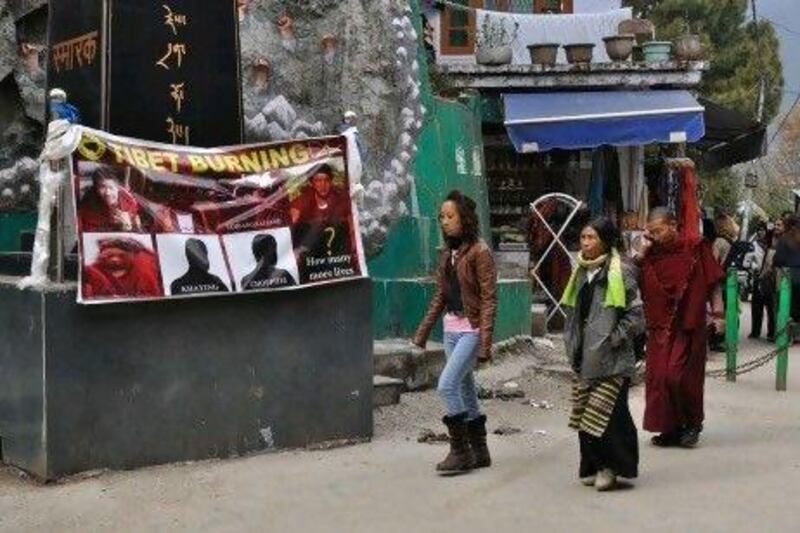MCLEOD GANJ, INDIA // At the martyrs' memorial near the exiled Dalai Lama's temple in the mountains of northern India, images of monks hang as a solemn tribute to their sacrifice. Lobsang Phuntsok, 20, set himself alight in Tibet last March to protest Chinese rule over his homeland. Tsewang Norbu, 29, did the same five months later. Next to their photographs, a question is scrawled: "How many more lives?"
But it is also a challenge to other Tibetans. One that here in the Tibetan exile capital and in China, they seem unable, or unwilling, to answer.
As Tibetans mark their new year this week, how to respond to an often suicidal form of protest is dividing a community five decades in exile in the Himalayas.
At least 22 monks, nuns and ordinary people have set themselves alight in the past year in Tibetan areas of western china. At least 14 have died.
Buddhists around the world have used immolation as political protest before.
In 1963, the Vietnamese monk, Thich Quang Duc, famously did so to draw attention the south's mistreatment of Vietnam's Buddhist population. Yet for Tibetans, no strangers to non-violent forms of resistance, self-immolation was almost unheard of before last year.
The first was in early 2009. Then nothing until March last year. Now there is one self-immolation almost every two weeks.
China's response has been unwavering. Beijing calls Tibetans terrorists and surrounds their monasteries and villages with paramilitaries and baton-wielding police.
In the town of Aba, or Ngaba in Tibetan, security forces are positioned every few metres along the main roads in and out.
Tibetans in exile, meanwhile, view the fiery acts of suicide as desperate appeals for help in countering China's repressive policies.
Where they differ is whether this is the best way to influence Beijing's behaviour or a self-defeating exercise that will only lead to more deaths.
The Dalai Lama, Tibet's spiritual leader, has conceded self-immolations will bring a harsh Chinese reaction. But he has called those setting themselves on fire courageous and not asked Tibetans to stop.
Kirti Rinpoche, the exiled Tibetan abbot of Kirti Monastery in Aba, said last week: "We don't have any reason to ask them to stop, because we are not encouraging them to do this. It depends on Chinese policy, if they change or not."
Western analysts tend to agree. Mary Beth Markey, president of the International Campaign for Tibet in the United States, said the immolation crisis was a desperate response to China's stranglehold on religious, cultural and economic freedoms.
"Policies that on the one hand withhold rights and on the other shake the foundation of Tibetan traditions and livelihoods, like the forced denunciation of the Dalai Lama or the settlement of hundreds of thousands of nomads into 'socialist villages', are a kind of Chinese juggernaut against a Tibetan population with no way to respond within the system," Ms Markey said.
Not all Tibetans see the immolations as the best way to bring about change. The Karmapa Lama, a senior figure in Tibetan Buddhism, who has lived in India since 1999 after fleeing into exile, has called for an end to the tactic.
Last year he told journalists Tibetans should "preserve their lives and find other, constructive ways to work for the cause of Tibet".
Tenzin Losel, a human-rights researcher based in McLeod Ganj, said Tibetans appreciate the bravery, but China has shown no willingness to loosen its grip. Beijing has only grown more emboldened.
"In the exile community, we admire the courage and understand under what kind of circumstances somebody chooses to die.
"But on the other hand, people feel like it has to be stopped," Mr Losel said. "We cannot lose so may people like this. We need people to live and fight."
In December, Zhu Weiqun, a senior Chinese communist party official, told European Union representatives in Brussels that "the Chinese government will not change work policies in Tibet and the attitude toward the Dalai clique even if such cases happen again".
During his visit to the US last week, China's vice president, Xi Jinping, was only slightly more diplomatic, urging the West not to push China on its "core interests" of Tibet and Taiwan.
Kanyag Tsering, a Tibetan monk in exile who escaped China in 1999, said the situation in Aba was more dire today than ever.
"Before I started my journey to India, the Chinese were launching a re-education campaign in my monastery," he said. "At that time 14 to 15 monks had been detained."
It is worse today, he said. "I was born in Tibet, I grew up in Tibet. I know what was going on there."
An acquaintance of one of those who killed themselves last year is even more emphatic.
This exiled Tibetan said: "If you raise your voice, you are going to be kicked down. If you say the truth, China is going to put you in prison or kill you or detain you." Self-immolations, he added, "will bring the Tibetan issue into the light".





